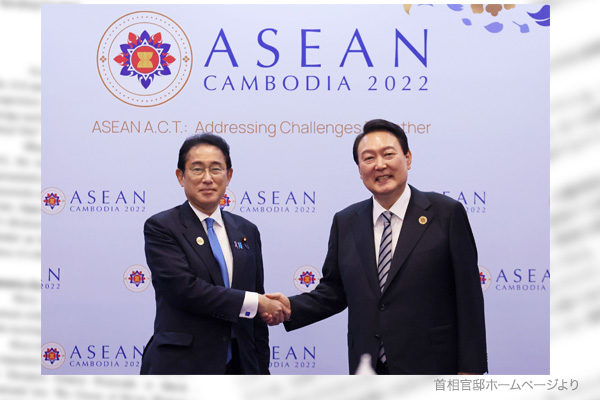On November 13, Japanese Prime Minister Fumio Kishida held his first official meeting with South Korean President Yoon Suk Yeol in Phnom Penh. South Korean government officials said although the Japanese and South Korean leaders discussed no specifics about the issue of wartime Korean workers in Japan, the number of potential solutions was narrowed down to one or two by working-level negotiators.
The Yoon government since its start has made efforts to avoid a situation in which some Japanese companies’ confiscated assets are converted into cash for compensation payments to wartime Korean workers, forcing the Japanese government to impose sanctions for it. An initially proposed solution called “payments by subrogation,” under which the South Korean government pays the compensation in place of the Japanese companies, has been dropped because it has been found that such payments must be approved by plaintiffs in suits for the compensation. Instead, a “concurrent debt assumption” formula, which would lead the Foundation for Victims of Forced Mobilization by Imperial Japan to assume the payments without approval by the plaintiffs, has emerged and the two countries’ foreign ministry officials are now discussing legal aspect of the proposal in detail, according to the officials.
Problems with the foundation’s assumption formula
There are three problems with the foundation’s proposed assumption of the compensation payments. The first is a trap of the Japanese companies’ involvement where Japanese companies could be required to be involved in the foundation’s paying process and forced to admit their debt. Under the “concurrent debt assumption” formula, the Japanese companies as debtor and the foundation as debt assumer are required to conclude a contract for the assumption. There also is an opinion in South Korea that the Japanese companies should invest in the foundation. The Japanese companies’ conclusion of such contract or investment in the foundation mean that they accept South Korean Supreme Court’s ruling that has ordered the compensation in violation of international law.
Among the Japanese companies, Nippon Steel Corp. and Mitsubishi Heavy Industries Ltd., have been acquitted of the responsibility for the compensation under Japanese court rulings. But the South Korean top court in its ruling in October 2018 concluded that Japanese court rulings ran counter to South Korean social order including good morals and could not be approved as effective. As a result, Japanese and South Korean judicial orders contradict with each other. In such situation, Japanese companies should not take any action to be interpreted as accepting the South Korean judicial order.
The second problem is the lack of fairness. If the foundation’s assumption of the compensation payments is realized through the South Korean government’s hard efforts, the Japanese companies’ assets may be protected. Such solution is welcomed as international law is abided by. In South Korea, however, many former wartime workers, soldiers and paramilitary personnel excluded from the solution are expected to erupt complaint saying it is unfair.
The third problem is the spell of South Korean top court ruling. It is based on the premise of the existence of “right to compensation for mental suffering from Japan’s illegal rule” of the Korean Peninsula. Such right was not admitted in the San Francisco Peace Treaty. The South Korean government has never asserted the right since the normalization of relations between the two countries in 1965. But some lawyers, scholars and activists in Japan and South Korea believe that Japan should pay such compensation.
Japan should not yield national interests
All the three problems are not easy to solve. The framework for the foundation's assumption of the compensation payments may be maintained only when the Yoon government keeps the governing power. The Japanese side should be prepared that a next government in South Korea might require Japanese government and companies to accept what would run counter to international law. While considering such possibility, Japan has no choice but to keep some distance from South Korea and deal with the country as far as Japan’s national interests are defended.
Tsutomu Nishioka is a senior fellow and a Planning Committee member at the Japan Institute for National Fundamentals and a visiting professor at Reitaku University. He covers South and North Koreas.


